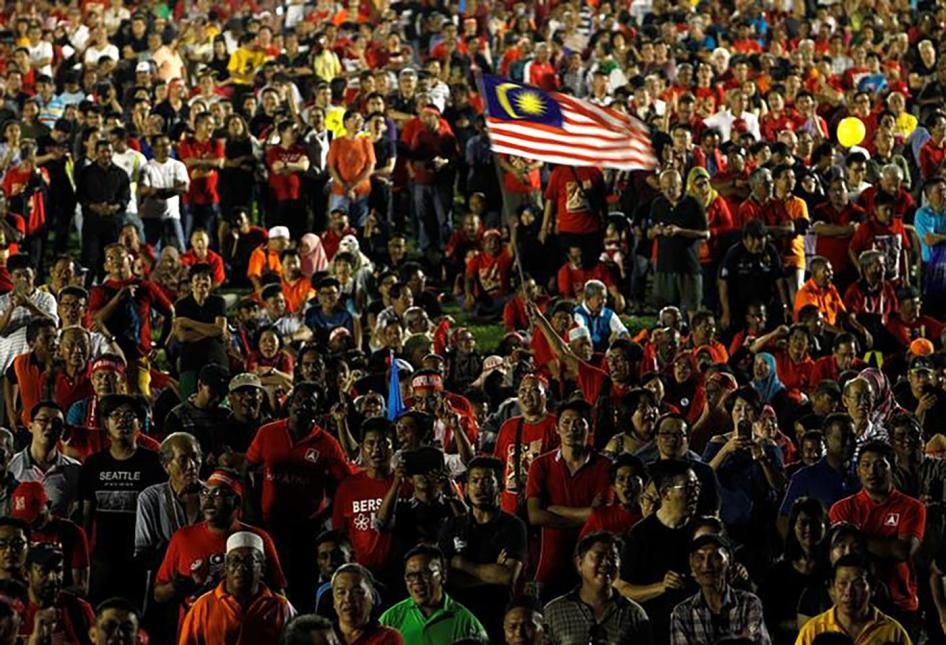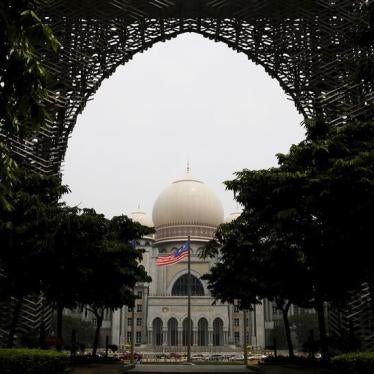(New York) – The Malaysian government cracked down on activists and opposition politicians critical of the government in 2017, Human Rights Watch said today in releasing its World Report 2018. With corruption allegations still casting a long shadow over Prime Minister Najib Razak and national elections scheduled for 2018, the government tightened repressive laws while lashing out against and criminally charging peaceful critics.
In the 643-page World Report, its 28th edition, Human Rights Watch reviews human rights practices in more than 90 countries. In his introductory essay, Executive Director Kenneth Roth writes that political leaders willing to stand up for human rights principles showed that it is possible to limit authoritarian populist agendas. When combined with mobilized publics and effective multilateral actors, these leaders demonstrated that the rise of anti-rights governments is not inevitable.
“Malaysia’s Prime Minister Najib has gone to great lengths over the past year to stifle critical commentary of his government,” said Phil Robertson, deputy Asia director. “The fear of further repression against activists will only increase as the 2018 elections approach.”
Najib’s claim in April 2017 that freedom of speech was “thriving” in Malaysia did not reflect the reality. The government repeatedly used the Communications and Multimedia Act to investigate and prosecute those who criticized government officials on social media. Among those prosecuted were top staff of the online news portal Malaysiakini over a video criticizing the attorney-general for clearing the prime minister of corruption allegations.
Human rights defenders continued to face legal attacks and arbitrary restrictions on their rights. In March, authorities investigated three members of the Citizen Action Group on Enforced Disappearances (CAGED) for making statements with “intent to cause fear and alarm in to the public” after they referred to the “enforced disappearances” of several missing Christian church members. In May, a court sentenced activist Lena Hendry to pay a fine of RM10,000 (US$2,062) or face a year in prison for arranging to show the documentary film “No Fire Zone.” In June, lawyer Siti Kassim was charged with “obstructing a public servant” for challenging the authority of state religious officials conducting a raid on a transgender beauty pageant in April 2016.
Discrimination against lesbian, gay, bisexual, and transgender (LGBT) people is pervasive in Malaysia. Violence against LGBT people was highlighted by the murder of transgender woman Sameera Krishnan in February and the rape and murder of T. Nhaveen, 18, whose assailants taunted her with anti-LGBT slurs, in June.
The government deployed draconian laws that permit detention without trial. Among them are the Security Offences (Special Measures) Act, which allows a 28-day detention without judicial review for a range of “security offenses.” The government also passed amendments to the similarly restrictive Prevention of Crime Act that effectively eliminated the right of a detainee to be heard.
The Malaysian government continued to shift toward a more conservative Islam, the majority religion. A bill that would allow state Sharia courts to impose higher punishments remains pending in parliament. In July, the state of Kelantan passed legislation to permit Sharia courts to order public canings. In September, the Federal Territories Islamic Religious Department detained and interrogated Turkish academic Mustafa Akyol, author of a book promoting liberal Islam, for giving a talk on Islam without official credentials from religious authorities. The organizer of the talk was charged with abetting Akyol and faces up to three years in prison. The home minister subsequently banned Akyol’s book, along with a collection of scholarly articles by the G25 organization, which endorses a more moderate approach to Islam.
“Malaysian government officials should speak out against the rising tide of religious intolerance rather than contribute to it,” Robertson said. “In a multi-ethnic, multi-religious country, Najib should defend the rights of everyone in the country to speak freely and practice their religion without fear.”









